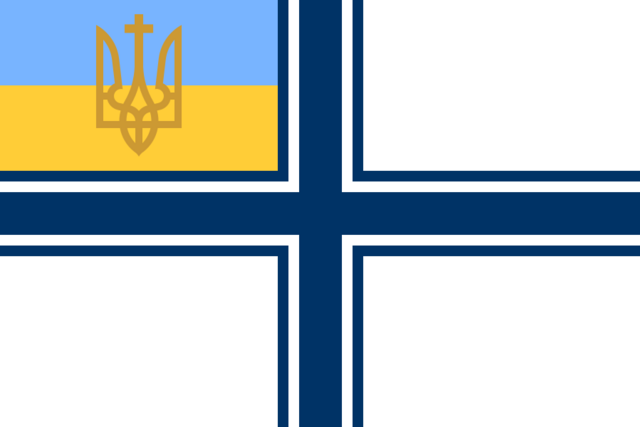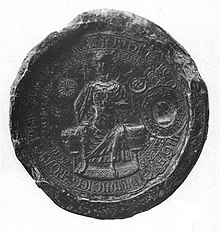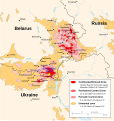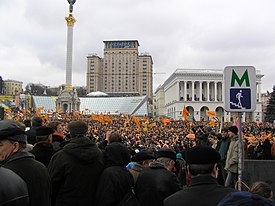Portal:Ukraine
Portal:Ukraine
Ukraine is a country in Eastern Europe. It is the second-largest European country after Russia, which borders it to the east and northeast. It also borders Belarus to the north; Poland, Slovakia, and Hungary to the west; and Romania and Moldova to the southwest; with a coastline along the Black Sea and the Sea of Azov to the south and southeast. Kyiv is the nation's capital and largest city, followed by Kharkiv, Dnipro and Odesa. Ukraine's official language is Ukrainian; Russian is also widely spoken, especially in the east and south.
During the Middle Ages, Ukraine was the site of early Slavic expansion and the area later became a key centre of East Slavic culture under the state of Kievan Rus', which emerged in the 9th century. The state eventually disintegrated into rival regional powers and was ultimately destroyed by the Mongol invasions of the 13th century. The area was then contested, divided, and ruled by a variety of external powers for the next 600 years, including the Polish–Lithuanian Commonwealth, the Austrian Empire, the Ottoman Empire, and the Tsardom of Russia. The Cossack Hetmanate emerged in central Ukraine in the 17th century marked on maps as "Ukraine, land of the Cossacks", but was partitioned between Russia and Poland, and ultimately absorbed by the Russian Empire. Ukrainian nationalism developed and, following the Russian Revolution in 1917, the short-lived Ukrainian People's Republic was formed. The Bolsheviks consolidated control over much of the former empire and established the Ukrainian Soviet Socialist Republic, which became a constituent republic of the Soviet Union when it was formed in 1922. In the early 1930s, millions of Ukrainians died in the Holodomor, a human-made famine. The German occupation during World War II in Ukraine was devastating, with 7 million Ukrainian civilians killed, including most Ukrainian Jews.
Ukraine gained independence in 1991 as the Soviet Union dissolved, and declared itself neutral. A new constitution was adopted in 1996. A series of mass demonstrations, known as the Euromaidan, led to the establishment of a new government in 2014 after a revolution. Russia then unilaterally annexed Ukraine's Crimean Peninsula, and pro-Russian unrest culminated in a war in the Donbas between Russian-backed separatists and government forces in eastern Ukraine. Russia launched a full-scale invasion of Ukraine in 2022. Since the outbreak of war with Russia, Ukraine has continued to seek closer ties with the United States, European Union, and NATO.
Ukraine is a unitary state and its system of government is a semi-presidential republic. A developing country, it is the poorest country in Europe by nominal GDP per capita and corruption remains a significant issue. However, due to its extensive fertile land, pre-war Ukraine was one of the largest grain exporters in the world. It is a founding member of the United Nations, as well as a member of the Council of Europe, the World Trade Organization, and the OSCE. It is in the process of joining the European Union and has applied to join NATO. (Full article...)
- 18 April 2024 – Russian invasion of Ukraine
- Germany arrests two German-Russian nationals for alleged military sabotage plot on behalf of Russia in an effort to undermine military support for Ukraine. (Reuters)
- 17 April 2024 – Russian invasion of Ukraine
- Chernihiv strikes
- At least 17 people are killed and 60 others are injured in a Russian missile strike which damaged an eight-storey building in a densely populated area of Chernihiv. (BBC News) (Reuters)
- 16 April 2024 – Russian invasion of Ukraine
- Ukrainian President Volodymyr Zelenskyy signs a new army draft law. (Reuters)
- 13 April 2024 – Russian invasion of Ukraine
- The Russian Ministry of Defence claims that the village of Pervomaiske near Donetsk has been captured by Russian troops. (Barron's)
- 12 April 2024 – Russian invasion of Ukraine
- Russian strikes against Ukrainian infrastructure
- Russia launches drone strikes across Ukraine. Critical infrastructure is damaged in Kherson Oblast and a fire occurs at the Dnieper Hydroelectric Station in Zaporizhzhia causing around half a tonne of oil products to leak into the Dnieper river. (Reuters) (Ukrainska Pravda)
- 11 April 2024 – Russian invasion of Ukraine
- Mykolaiv strikes
- At least four people are killed and five others are injured in a Russian missile strike in Mykolaiv. (Reuters)
- Russian strikes against Ukrainian infrastructure

- ... that in August 2022, Igor Mangushev spoke on a stage in a Russian nightclub with what he said was the skull of a Ukrainian soldier killed in the Azovstal Iron and Steel Works?
- ... that Ukrainian baritone Danylo Matviienko, who holds a master's degree in mathematics, appeared as Demetrius in Britten's opera A Midsummer Night's Dream at the Oper Frankfurt?
- ... that Sarah Ashton-Cirillo, covering the Russian invasion of Ukraine, said that Ukrainians care less about her being transgender than Americans do?
- ... that following the Russian invasion of Ukraine, a diverse group of exiled Russian public figures formed the Anti-War Committee of Russia to unite different political movements to oppose the war?
- ... that German violinist and professor Aleksey Semenenko was stranded in Ukraine for a month because Russia invaded the country the day after his performance?
- ... that Artem Datsyshyn, the National Opera of Ukraine's principal dancer in ballets such as Swan Lake and La Bayadère, is said to have danced with "romantic sublimity" and "psychological depth"?
- ... that Ukrainian naturalist, lecturer, artist and author John Lhotsky was credited as the first discoverer of gold in New South Wales?
- ... that Ukrainian composer Mykola Leontovych (pictured), known for the "Carol of the Bells", was nicknamed "Ukrainian Bach" in France?
- ... that the Privat Group is one of the few Ukrainian companies that own industries in the United States?
- ... that the longest of the Kiev bridges, the 1,543 metres long Paton Bridge over the Dnieper River, constructed in 1953 was the first fully welded steel construction of such length at that time?
- ... that the Kryvbas economic region in Ukraine is one of the largest iron ore and steel industry centers in Europe?
- ... that the married Western Ukrainian Clergy became a hereditary caste that dominated western Ukrainian society?
The Orange Revolution (Ukrainian: Помаранчева революція, romanized: Pomarancheva revoliutsiia) was a series of protests, that lead to political upheaval in Ukraine from late November 2004 to January 2005. It gained momentum primarily due to the initiative of the general population, sparked by the aftermath of the 2004 Ukrainian presidential election run-off which was claimed to be marred by massive corruption, voter intimidation and electoral fraud. Kyiv, the Ukrainian capital, was the focal point of the movement's campaign of civil resistance, with thousands of protesters demonstrating daily. Nationwide, this was highlighted by a series of acts of civil disobedience, sit-ins, and general strikes organized by the opposition movement.
The protests were prompted by reports from several domestic and foreign election monitors as well as the widespread public perception that the results of the run-off vote of 21 November 2004 between leading candidates Viktor Yushchenko and Viktor Yanukovych were rigged by the authorities in favour of the latter. The nationwide protests succeeded when the results of the original run-off were annulled, and a revote was ordered by Ukraine's Supreme Court for 26 December 2004. Under intense scrutiny by domestic and international observers, the second run-off was declared to be "free and fair". The final results showed a clear victory for Yushchenko, who received about 52% of the vote, compared to Yanukovych's 44%. Yushchenko was declared the official winner and with his inauguration on 23 January 2005 in Kyiv, the Orange Revolution ended. In the following years, the Orange Revolution had a negative connotation among pro-government circles in Belarus and Russia. (Full article...)- 18 April 2024 – Russian invasion of Ukraine
- Germany arrests two German-Russian nationals for alleged military sabotage plot on behalf of Russia in an effort to undermine military support for Ukraine. (Reuters)
- 17 April 2024 – Russian invasion of Ukraine
- Chernihiv strikes
- At least 17 people are killed and 60 others are injured in a Russian missile strike which damaged an eight-storey building in a densely populated area of Chernihiv. (BBC News) (Reuters)
- 16 April 2024 – Russian invasion of Ukraine
- Ukrainian President Volodymyr Zelenskyy signs a new army draft law. (Reuters)
- 13 April 2024 – Russian invasion of Ukraine
- The Russian Ministry of Defence claims that the village of Pervomaiske near Donetsk has been captured by Russian troops. (Barron's)
- 12 April 2024 – Russian invasion of Ukraine
- Russian strikes against Ukrainian infrastructure
- Russia launches drone strikes across Ukraine. Critical infrastructure is damaged in Kherson Oblast and a fire occurs at the Dnieper Hydroelectric Station in Zaporizhzhia causing around half a tonne of oil products to leak into the Dnieper river. (Reuters) (Ukrainska Pravda)
- 11 April 2024 – Russian invasion of Ukraine
- Mykolaiv strikes
- At least four people are killed and five others are injured in a Russian missile strike in Mykolaiv. (Reuters)
- Russian strikes against Ukrainian infrastructure

- April 16, 2000 — Ukraine's national referendum takes place on the issue of reformation the governing system of Ukraine.
- April 22, 2006 — Two homemade bombs exploded in different supermarkets in the Ukrainian city of Kharkiv.
- April 26, 1986 — Reactor No. 4 of the Chernobyl Nuclear Power Plant exploded at 01:23 A.M.
- April 29, 1918 — Constitution of the Ukrainian People's Republic, a constitutional document, was approved by the Central Rada, but never announced.
- April 29, 1918 — The Holiday of Ukrainian Sea. On this day the main parts of Black Sea fleet in Sevastopol hoisted ukrainian flags.
Religions in Ukraine
Post Soviet states
Other countries
The following Wikimedia Foundation sister projects provide more on this subject:
-
Commons
Free media repository -
Wikibooks
Free textbooks and manuals -
Wikidata
Free knowledge base -
Wikinews
Free-content news -
Wikiquote
Collection of quotations -
Wikisource
Free-content library -
Wikiversity
Free learning tools -
Wikivoyage
Free travel guide -
Wiktionary
Dictionary and thesaurus
- In this name that follows Eastern Slavic naming customs, the patronymic is Ilyich and the family name is Brezhnev.


































































